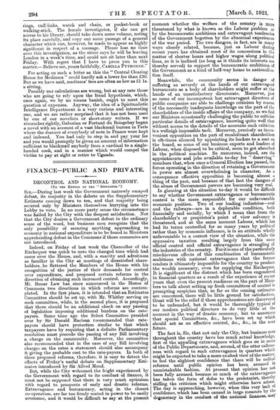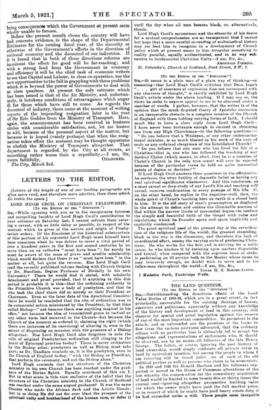FINANCE—PUBLIC AND PRIVATE.
DECONTROL AND NATIONAL ECONOMY.
(To THE EDITOR OF THE "SPECTATOR."] Sin,—During last week the Government narrowly escaped defeat, its majority in the debate on the Supplementary Estimate coming down to ten, and that majority being secured only by Ministers themselves hurrying into the Lobby to vote. In no mere party sense the circumstance was hailed by the City with the deepest satisfaction. Not that the City desires a Government defeat in the ordinary sense of the word, but business men recognize that the only possibility of securing anything approaching to economy in national expenditure is to be found in Ministers apprehending defeat in the Commons if those economies, are not introduced.
Indeed, on Friday of last week the Chancellor of the Exchequer was quick to note the changed tone which had come over the House, and, with a suavity and adroitness so familiar in the City at meetings of dissatisfied share- holders, he flattered the Members of the House with his recognition of the justice of their demands for control over expenditure, and proposed certain reforms in the direction of obtaining such increased control. Accordingly, Mr. Boner Law has since announced in the House of Commons two directions in which reforms are contem- plated. In the first place, it is intended that an Estimates Committee should be set up, with Mr. Whitley serving on such committee, while, in the second place, it is proposed that there should be an additional check on any passing of legislation imposing additional burdens on the rate- payers. Some time ago the Select Committee presided over by Sir Donald Maclean recommended that rate- payers should have protection similar to that which taxpayers have by requiring that a definite Parliamentary resolution must precede the passing of any Bill involving a charge on the community. Moreover, the committee also recommended that in the case of any Bill involving charges on the rates a statement should also accompany it giving the probable cost to the rate-payers; In both of these proposed reforms, therefore, it is easy to detect the effects of Friday's useful debate on Supplementary Esti- mates introduced by Sir Alfred Mond.
But, while the City welcomed the fright experienced by the Government- with regard to its conduct of finance, it must not be supposed that there is very much optimism with regard to prospects of early and drastic reforms. Extravagance and bureaucracy, acting in the closest co-operation, are far too firmly- seated in power to be easily overcome, and it would be difficult to say at the present moment whether the welfare - of the country is more threatened by what is known as the Labour problem or by the bureaucratic ambitions and extravagant tendencies of the Government begotten by the abnormal experience of the war period. The two dangers, in fact, are in many ways closely related, because, just as Labour during recent years has obtained most of its concessions in the matter of shorter hours and higher wagers along political lines, so it is inclined (as long as it thinks its interests are thereby served) to support the bureaucratic ambitions of the Government as a kind of half-way house to nationaliza- tion itself.
Meanwhile, the community seema in danger of suffering as severely at the hands of our extravagant bureaucrats as a body of shareholders might suffer at the hands of an unsatisfactory directorate. Moreover, just as some of our incompetent but extravagant directors of public companies are able to challenge criticism by reason of the necessarily inadequate knowledge on the part of the shareholders of the inside affairs of the company, so we find our Ministers occasionally challenging the public to criticize particular details of extravagance, knowing. quite well that without access to the details of the accounts such criticism is a wellnigh impossible task. Moreover, precisely as incon- venient opposition on the part of recalcitrant shareholders is oft-times silenced by appointing its leaders to a seat on the board, so some of our business experts and leaders of Labour, when disposed. to be critical, seem to get absorbed in the political machine. So numerous, indeed, are the appointments and jobs available to-day for " deserving " members that, when once a G eneral Election has passed., the forces operating in the direction of retaining & Government in power are almost overwhelming in ohmmeter. As a consequence effective opposition is becoming almost a thing of the past, and. because of that fact the dangers of the abuse of Government powers are becoming very real.
In glancing at the situation to-day it .would be difficult to say whether Government extravagance or bureaucratic control is the more responsible for our unfavourable economic position. Two of our leading industries coal and the railways—are in a. deplorable condition, both financially and socially, by which I mean that from the shareholder's or proprietor's point of view solvency is threatened, and at the same moment Labour, which has had its terms controlled for so many years by political rather than by economic influence, is in an attitude wholly unfavourable to a correct view of the situation, while the oppressive taxation resulting 'largely from this same official control and official extravagance is strangling all the industries of the country. For it is one of the particularly mischievous effects of this combination of bureaucratic ambitions with national extravagance that the former renders it ultimately impossible for the' country to produce the wealth necessary, even for supplying the Exchequer. It is significant of the distrust which_has been engendered in financial quarters as a result of the experience of recent years that even the present readiness on the part of. Minis- ters to talk about setting up fresh committees of control is prompting suspicion that, so far as the coming estimates are concerned., there will be little ground for satisfaction. Great will be the relief if these apprehensions are discovered to be unfounded, but it would be thoroughly typical of our modern political directors to do very little at the moment in the way of drastic economy, but to announce that special Committees, &c., have been set up which should act as an effective control, &c., &c., in the near future.
The fact is, Sir, that not only the City, but business men throughout the country have too much actual knowledge, first of the appalling extravagance which goes on in some of the Public Departments, and, second, of the utter callous- ness with regard to such extravagance in quarters which might be expected to take a more exalted view of the matter, to feel the slightest confidence that there will be radical reforms until public opinion has been aroused in unmistakable fashion. At present that opinion has not been fully aroused. because. so much of the extravagance has taken the form of doles to the proletariat, thereby stiffing the criticism which might otherwise have arisen- The day is approaching, however, when this very lack of confidence, which has been caused in large measure by the degeneracy in the conduct of the national- finances, maY bring consequences which the Government.st present seem wholly unable to foresee. Before the present month closes the country will have had concrete evidence, in the shape of the Departmental Estimates for the coming 'fiscal year, of the sincerity or otherwise of the Government's efforts in the direction of national economy and the decontrol of our industries. If it is found that in both of these direotions reforms are imminent the •effect for good will be far-reaching; and with a strong lead from the Government in economy and efficiency it will be the chief task of economic writers to see that Capital and Labour, in close co-operation, use the new upportunities to the full in grappling-with those problems which it is beyond the power of Governments to deal with at close quarters. At present the only estimate which has been issued is that of the Air Ministry, and, unfortun- ately, it betokens conditions of extravagance which augur ill for those which have still to come. As regards the decontrol of industry, there come at the moment of writing reports of the impending resignation later in the year of Sir Eric Geddes from the Ministry of Transport. Here, again, the announcement has been received in business circles with considerable satisfaction, not, let me hasten to add, because of the personal aspect of the matter, but because it is hoped (vainly perhaps) that when the resig- nation takes effect the moment may be thought -opportune to abolish the Ministry of Transport altogether. That department is regarded, by the City at all events, as something rather worse than a superfluity.—I am, Sir,



































 Previous page
Previous page